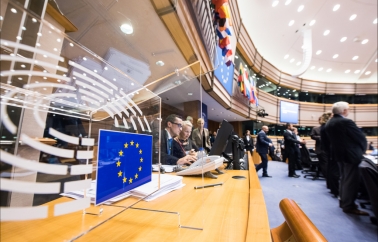
Commission issues Country-Specific Recommendations and takes fiscal decisions-European Commission's website
The European Commission issued country-specific economic policy guidance to Member States and took decisions linked to deficit targets. The Commission also published its latest progress report on relocation and resettlement of refugees and examined a draft Rule of Law Opinion for Poland.
European Semester Package
As part of the Spring 2016 European Semester package, the European Commission today proposed its 2016 Country-Specific Recommendations (CSRs), setting out its economic policy guidance for individual Member States for the next 12 to 18 months.
As external factors supporting Europe's moderate recovery are fading, domestic sources of growth are gaining in importance underlining the need to accelerate reform efforts. Today's recommendations therefore focus on the Commission's three priority areas: boosting investment, implementing structural reforms and pursuing fiscal responsibility.
The recommendations also reflect the Commission's efforts to make the European Semester of economic governance more effective and relevant. The Commission has for example proposed fewer recommendations with a focus on key economic and social priorities identified in its Annual Growth Survey 2016.
The Commission has also taken a number of fiscal decisions under the Stability and Growth Pact.
Overall, the aggregate deficit level in the euro area is set to fall to 1.9% this year, down from a peak of 6.1% in 2010.
In the light of latest data, the European Commission recommended to the Council to close the Excessive Deficit Procedure (EDP) for Cyprus, Ireland and Slovenia as these countries have brought their deficits below the 3% of GDP Treaty reference value in 2015 and the correction is expected to be durable. If the Council so decides, this would reduce the total number of Member States in the Excessive Deficit Procedure to six, down from 24 in spring 2011.
Second, the Commission adopted reports for Belgium, Italy and Finland under Article 126(3) TFEU, in which it reviews their compliance with the debt criterion of the Treaty. While these countries appear to be at variance with the debt reference value, and the benchmark pace of reduction towards it, the reports, after analysing the relevant factors, suggest that the Stability and Growth Pact should be considered as currently complied with. For Italy, the Commission will review its assessment of the relevant factors in a new report by November as further information on the resumption of the adjustment path towards the medium-term budgetary objective for 2017 becomes available.
As regards Portugal and Spain, the Commission recommends to the Council to recommend a durable correction of the excessive deficit in 2016 and 2017 respectively, by taking the necessary structural measures and by using all windfall gains for deficit and debt reduction. In line with its duty to monitor the implementation of the excessive deficit procedure under Article 126 of the Treaty, the Commission will come back to the situation of these two Member States in early July.
Finally, the Commission has launched a formal consultation to the Member States that are contracting parties of the Fiscal Compact to enquire about their progress in implementing in national law the provisions of the Fiscal Compact. The Member States concerned have two months to submit their observations to the Commission.
Progress report on the EU's emergency relocation and resettlement schemes
The Commission adopted its third progress report on the EU's emergency relocation and resettlement schemes, assessing actions taken up to 13 May 2016.
Overall, progress remains unsatisfactory since the Commission's second report, despite signs of increased preparation for future action: few relocations have taken place since mid-April, though the pipeline of future relocations has been strengthened.
Progress has been made on resettlement as part of the implementation of the EU-Turkey Statement, but must be accelerated to avoid migrants returning to irregular routes. According to the report, greater efforts on relocation are increasingly urgent in view of the humanitarian situation in Greece and the increase in arrivals to Italy.
The Commission urged Member States to put in place effective planning to increase their pledges and reduce the response time on relocation requests. The Commission also called on Member States with large allocations to engage more actively in relocation and pledge according to the size of their allocation. Moreover, the Commission called for all actors to step up the relocation of unaccompanied minors.
Rule of Law in Poland
The College of Commissioners discussed the current situation concerning the Rule of Law in Poland – based on an oral presentation by First Vice-President Timmermans regarding the state of play of the intensive dialogue that has been ongoing with the Polish authorities since 13 January on the situation of the Constitutional Tribunal.
The College examined a draft Rule of Law Opinion, structuring and formalising the assessment of the current situation, and empowered First Vice-President Timmermans to adopt the Opinion by 23 May, unless significant progress is made by the Polish authorities to resolve the concerns expressed by the European Commission before that date.
Glyphosate
Finally, the College took note of the current state of play in the authorisation procedure of glyphosate beyond 30 June.



